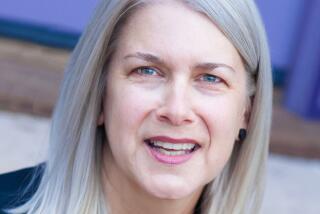An island apart
- Share via
IT’S all very well for Bill Holm -- he’s had the revelation. You know, that moment when the light hits just so and you realize how little time you have left and how stupid it would be to waste it by rushing around chasing money or gadgets or someone else’s dreams. This has led him to a form of Curmudgeon Lit: Thoreau, Wendell Berry, Holm, all authors determined to raise hackles and inspire small changes in the lives of readers. “Our great American conscience nagger,” Holm once called Thoreau, and the apple does not fall far from the tree, judging by his new book, “Windows of Brimnes.” But when Holm (whose name means “island” in Old Norse) went looking for his Walden Pond, he chose Iceland, the home of his ancestors.
Holm has written about Iceland before, perhaps most vividly in the collection of essays “Eccentric Islands: Travels Real and Imaginary.” In 1979, the 35-year-old grandson of four Icelandic immigrants to Minnesota went there to teach American literature, becoming “a half-dropout from academic life, and almost a full dropout from the American economy.” He wrote about his Icelandic arrogance -- what he called the myth of the “farmer intellectual” -- a belief in poetry, poverty and the refusal to bow down to the rich and powerful.
None of this has changed in the seven years since that book was published; Holm, who looks like a cross between Robertson Davies and Father Christmas, is as forceful, insightful and lyrical as ever in “Windows of Brimnes.” A reader sinks almost immediately into the hands of a master storyteller, a true rambler.
What has changed is that Holm in 1998 bought a piece of paradise, a little house called Brimnes (“Brim” means waves or surf in Icelandic; “nes” means cape or promontory), one of 15 cottages scattered by the sea in Hofsos (a town of 200 people) “like a child’s spilled Lego blocks.” The first night he and his wife slept at Brimnes, they opened the window and heard “the swish of fjord and roar of river.” Happily, he reports, “There is no such sleep, no such music to calm the interior frenzy, to lullaby your demons into drooling irrelevance.”
Never a patriot in the traditional sense of the word, Holm found that after Sept. 11, Brimnes became even more of a refuge. He was sick of being disliked around the world simply for being American. He was tired of the noise and jangle of American life: “After a while the United States is simply too much: too much religion and not enough gods, too much news and not enough wisdom, too many weapons of mass destruction -- or, for that matter, of private destruction . . . too much entertainment and not enough beauty, too much electricity and not enough light, too much lumber and not enough forests, too much real estate and not enough earth, too many books and not enough readers . . . too much security and not enough civility, too many humans but not enough eagles. And the worst excess of all: too many wars, too much misery and brutality -- reflected as much in our own eyes as in those of our enemies. So I come here to this spare place.”
Now in his early 60s, Holm, a professor of English and creative writing in Minnesota, spends each May through September in Iceland, looking out Brimnes’ windows, west over the ocean. He thinks about people, music, language and nature, about his predecessors. “We stand on the shoulders of our ancestors,” he wrote in “Eccentric Islands,” “no matter how many machines we invent. Only our memory and our metaphors carry us forward, not our money, not our gadgets, not our opinions.” He thinks about eider ducks, plovers, whimbrels and ravens. He thinks about the little people (not to be confused with elves) who still loom in the imaginations of Icelanders. He thinks about the importance of family (“What good is history itself if you can’t identify relatives?”). He thinks about his neighbor Valgeir, who started a kind of museum called the Icelandic Emigration Center, which attracts visitors from all over the world who come to research their ancestry.
Holm also thinks about modern American life (and the plague of weed whackers now threatening the silence of Iceland). U.S. political life, he writes, remembering the Vietnam War, “seemed an impacted bowel in 1968, as it does again in 2007. No large voices rose to say no, to take responsibility for doing what they could to end the slaughter.” He thinks of how pleasant it is to be in Iceland, which “escaped the most extreme fanatical paroxysms within Christianity. Some witches were burned in the seventeenth century, all but a few of them men. Their chief offense seems to have been swindling farms from the living. No kinky sexual stuff.”
Sure, every few years Holm gets bad weather -- namely, murky, wet summers. (“[O]nly Bach can cut through this -- and a little whiskey to warm the innards.”) But Iceland, he writes, is selling itself off bit by bit to the aluminum companies, dazzled “by words like jobs, progress, development, tax base, and opportunity, they are damming up, tunneling, gouging, and dynamiting several hundred square miles of their country -- wilderness, even -- for money.”
Holm peers into the fog, framed by the windows of his little house (for this book is, after all, a kind of love letter to a safe place), framed by his ancestors, his genealogy, his life as an American, for better or worse, at the beginning of the Godforsaken 21st century. And I would guess that he sees himself as a human peninsula, a small piece of good soil from a denuded but once lovely country; faulty, polluted, full of pain and some regret, but still traveling, still watching, still writing.
More to Read
Sign up for our Book Club newsletter
Get the latest news, events and more from the Los Angeles Times Book Club, and help us get L.A. reading and talking.
You may occasionally receive promotional content from the Los Angeles Times.







